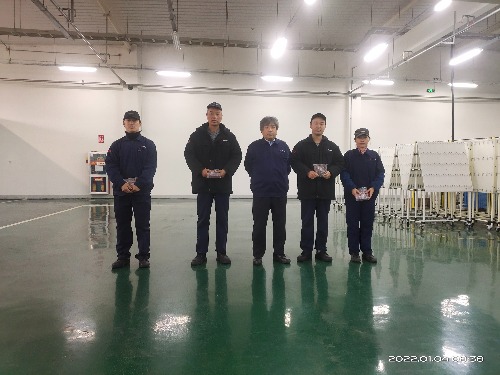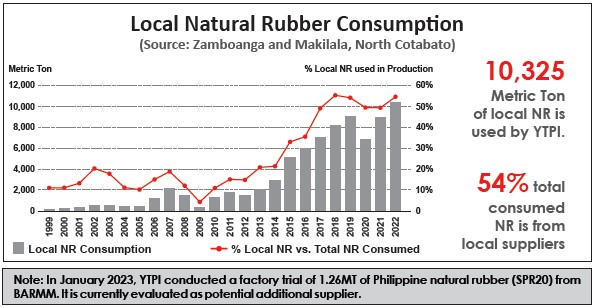Community Involvement and Development
Market Presence
KPI
Move the screen to the left or right to see the table information
| Item | FY 2021 results | FY 2022 results |
|---|---|---|
| Ratio of business locations that have made salary payments exceeding the minimum wage | (Consolidated) 100% | (Consolidated) 100% |
| Percentage of senior managers hired from the local community | (Consolidated) 37.5% | (Consolidated) 34.1% |
Responsible Departments
Each business location and HR Department
Our position and Targets
Why is “Market Presence” a critical issue to be addressed?
Explanation of the reason and background
As a large automotive market shifts overseas going forward, production and sales at each business location must be conducted for products that respond to the demands of each country and region. Furthermore, there will be no growth if business activities are not conducted in line with the unique cultures and customs of each country and region. For this reason, we recognize the importance of employing employees from the region of business locations, promoting these employees to management positions, conducting business activities, and producing economic benefits in these regions.
Vision and targets
In the tire business, we will promote the "Product and Regional Business Strategy" to expand sales of products in line with market trends in each region. The Group will review its existing production system and consider increasing production at its overseas tire plants in line with future market trends.
To this end, we will conduct employment in the countries and regions where business locations are located, promote theses employees to management positions, rotate these employees on a global level, and conduct training programs to accumulate knowledge.
To this end, we will conduct employment in the countries and regions where business locations are located, promote theses employees to management positions, rotate these employees on a global level, and conduct training programs to accumulate knowledge.
Measures for vision achievement
- Employment of local human resources for operations at each business location, development of management candidates
- Development and training for global human resources, global rotation of human resources
Review of FY 2022 Activities
The salaries for operations for local employees at overseas business locations are set in consideration of the wage provisions set by law in that country and region. In addition, a salary system has been developed based on skills improvements and position assignments.
We aim to achieve a harmonious existence with local communities, where key business sites focus on sourcing raw materials and resources from local suppliers.
Examples of the ratio of local procurement at overseas sites include 58.62% in Russia (43.2% within Russia) and 94.6% in India (80.1% within India) (initiatives have ended in China). We are also focusing on local procurement of natural rubber in the Philippines (54% in FY2022).
We aim to achieve a harmonious existence with local communities, where key business sites focus on sourcing raw materials and resources from local suppliers.
Examples of the ratio of local procurement at overseas sites include 58.62% in Russia (43.2% within Russia) and 94.6% in India (80.1% within India) (initiatives have ended in China). We are also focusing on local procurement of natural rubber in the Philippines (54% in FY2022).
Yokohama Tire Vietnam Inc. (YTYI) (Vietnam)
We have 7 Japanese employees out of a total of 608, and we encourage the appointment of women to management positions (General manager class). Three of our ten managers are currently women. Our operation is supported by the success of women in leadership positions.
Hangzhou Yokohama Tire Co., Ltd. (YIPHZ) (China)
Of the 141 employees, six are Japanese and eight management positions are held by local staff. Of the total number of employees, 30% are women. The number of female managers at the section manager level and above is almost 50%, and there are equal opportunities for advancement and promotion for both men and women. We have a system that allows employees to take maternity leave as needed, and we also recruit widely from the Hangzhou area to provide equal hiring opportunities and fair promotion and advancement within the company without discrimination based on gender or region of origin.

10-year service employee commendation
Yokohama India Pvt. Ltd. (YIN) (India)
With the full-scale introduction of a management system with local employees, we are building an organization with a sense of unity in production and sales, as well as a sense of speed in decision-making, and to support this, we are regularly reviewing business procedures and job authority regulations, and revamping our personnel system. In hiring, assigning, and evaluating employees, we do not discriminate on the basis of race, religion, gender, age, or any other factors, and we operate fairly and consistently without any preconditions in accordance with our policies. We also ensure that all employees are familiarized with this policy through training at the time of hiring and periodic refresher courses. We also follow a clear policy on unethical behavior and harassment in the workplace.
On the other hand, based on the Code of Conduct for employee, which contains clear criteria and procedures for decision-making, we operate disciplinary and grievance mechanism for employees, as well as an objection system, in a fair manner.
Of the 825 employees, three are Japanese and 54 are in management positions, all of whom are local staff, one of whom is female.
On the other hand, based on the Code of Conduct for employee, which contains clear criteria and procedures for decision-making, we operate disciplinary and grievance mechanism for employees, as well as an objection system, in a fair manner.
Of the 825 employees, three are Japanese and 54 are in management positions, all of whom are local staff, one of whom is female.
Suzhou Yokohama Tire Co., Ltd. (CSZY) (China)
As part of efforts to hiring personnel from local communities, management positions are not only filled with internal promotions, but also hiring from outside the company. Of the 25 management positions, four are Japanese and other members are local staff. We also have one female General Manager and four Section Managers.
Gender plays no role in the hiring, compensation and other conditions for employees. Of our total 830 employees (as of the end of December 2022), 122 are females.
Gender plays no role in the hiring, compensation and other conditions for employees. Of our total 830 employees (as of the end of December 2022), 122 are females.
Yokohama Tire Philippines, Inc. (YTPI) (Philippines)
We are focusing on raising the ratio of expenditure towards local suppliers for key business sites.
In the Philippines, efforts have expanded since 2014 toward local production and local consumption of natural rubber. In FY2022, this ratio was 54%.
In the Philippines, efforts have expanded since 2014 toward local production and local consumption of natural rubber. In FY2022, this ratio was 54%.

For other initiatives, please refer to Fair Operating Practices > Promoting Local Procurement Adoption.
Future challenges
Together with the expansion of operations at business locations overseas, we will instill the Action Guidelines among employees newly joining the Yokohama Rubber Group. In addition, the establishment of a structure that makes cooperative activities aimed at the resolution of social problems that communities face is an issue, in addition to the economic effect associated with business activities.


